Consumer Behaviour & Insight Report: International Travel & Tourism
VerifiedAdded on 2023/06/17
|14
|4046
|398
Report
AI Summary
This report delves into consumer behavior and insights within the international travel and tourism sector, focusing on the TUI Group. It investigates psychological, social, cultural, and personal factors influencing consumer attitudes and behaviors, alongside the impact of digital technology on consumer trends. The report examines the stages of the consumer decision-making journey, mapping a path to purchase for tourism services and highlighting the importance of this mapping for marketers. Furthermore, it differentiates between B2B and B2C decision-making processes with hospitality examples, explores market research approaches, and examines how marketers respond to the decision-making process, providing a comprehensive overview of consumer behavior in the tourism industry.
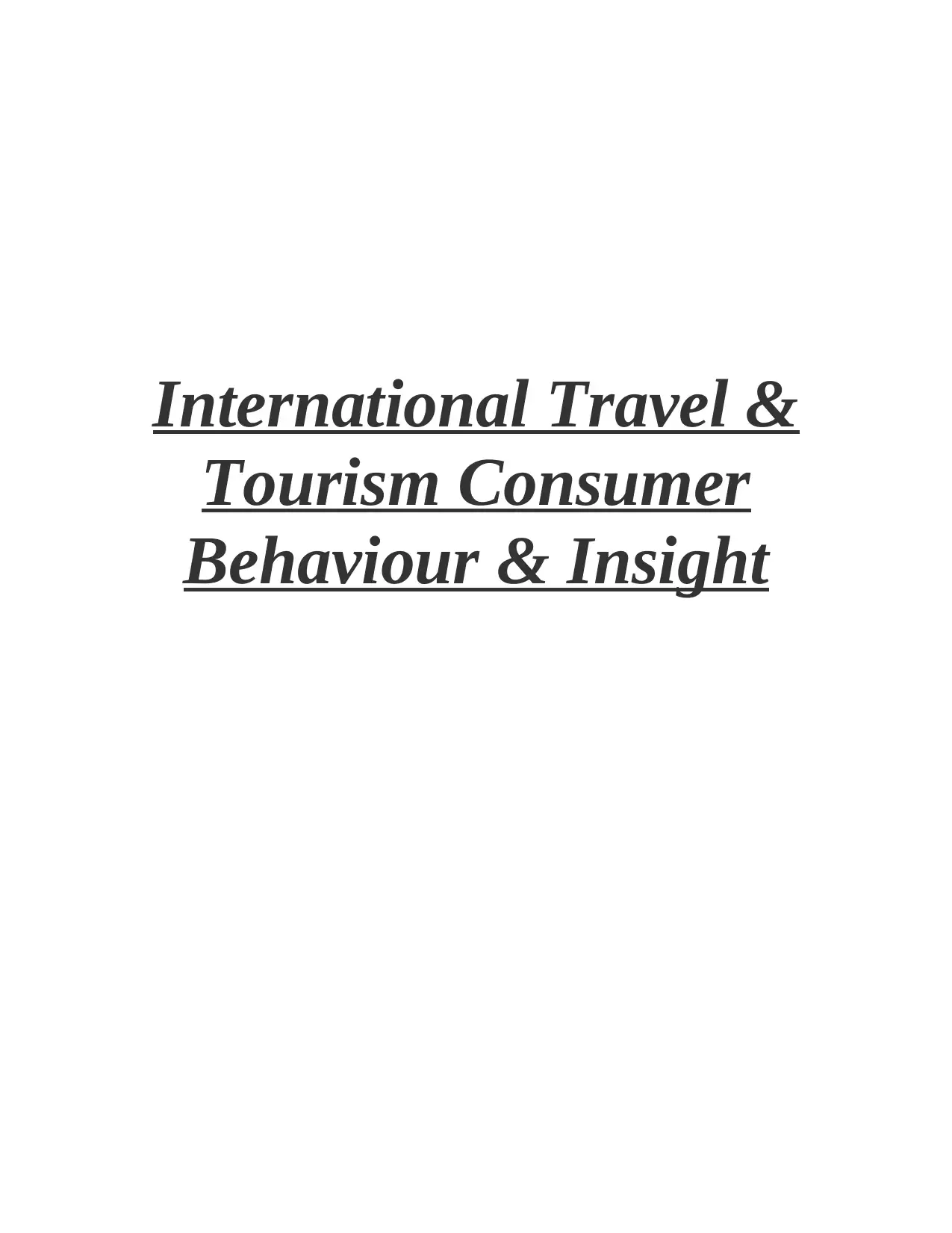
International Travel &
Tourism Consumer
Behaviour & Insight
Tourism Consumer
Behaviour & Insight
Paraphrase This Document
Need a fresh take? Get an instant paraphrase of this document with our AI Paraphraser
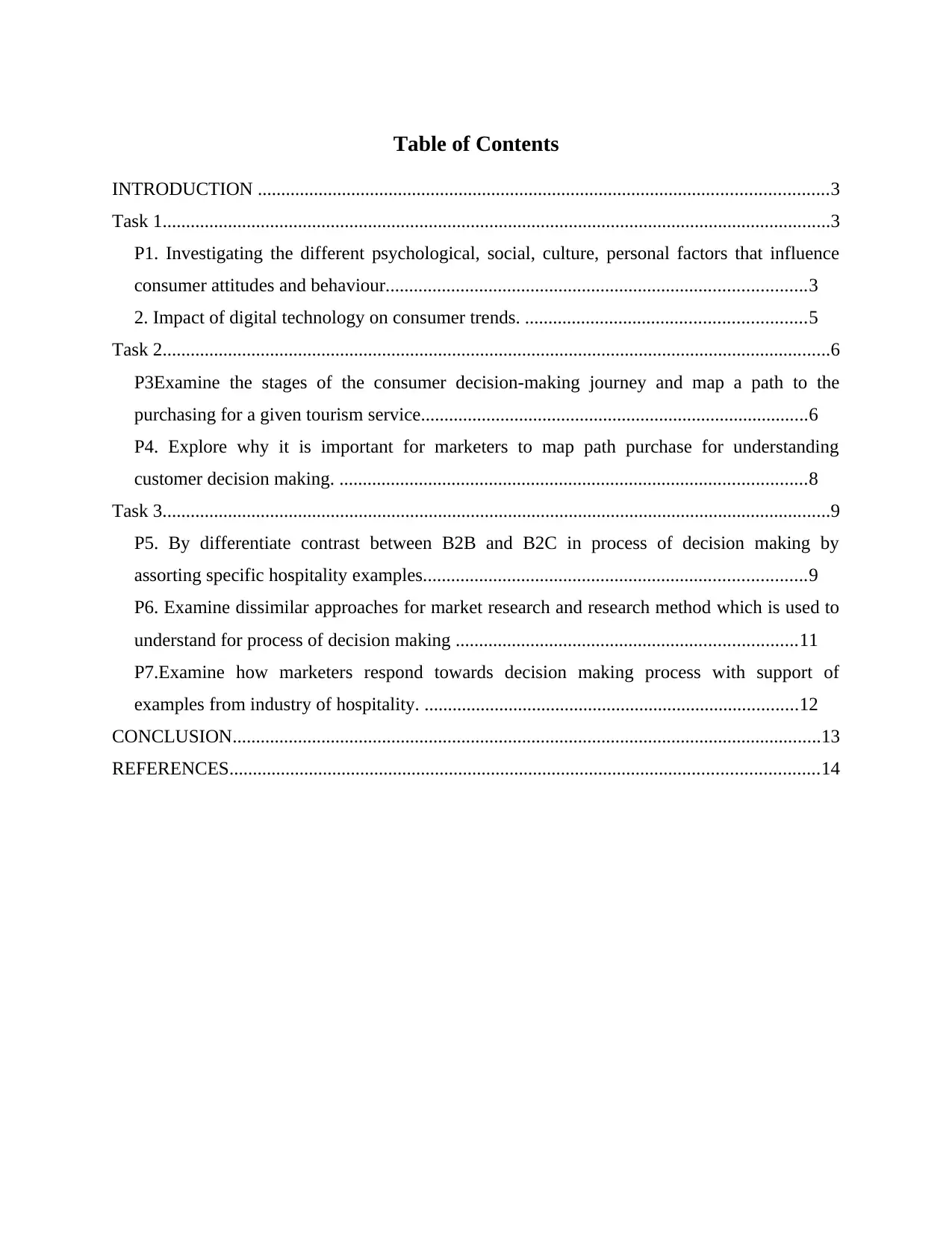
Table of Contents
INTRODUCTION ..........................................................................................................................3
Task 1...............................................................................................................................................3
P1. Investigating the different psychological, social, culture, personal factors that influence
consumer attitudes and behaviour..........................................................................................3
2. Impact of digital technology on consumer trends. ............................................................5
Task 2...............................................................................................................................................6
P3Examine the stages of the consumer decision-making journey and map a path to the
purchasing for a given tourism service...................................................................................6
P4. Explore why it is important for marketers to map path purchase for understanding
customer decision making. ....................................................................................................8
Task 3...............................................................................................................................................9
P5. By differentiate contrast between B2B and B2C in process of decision making by
assorting specific hospitality examples..................................................................................9
P6. Examine dissimilar approaches for market research and research method which is used to
understand for process of decision making .........................................................................11
P7.Examine how marketers respond towards decision making process with support of
examples from industry of hospitality. ................................................................................12
CONCLUSION..............................................................................................................................13
REFERENCES..............................................................................................................................14
INTRODUCTION ..........................................................................................................................3
Task 1...............................................................................................................................................3
P1. Investigating the different psychological, social, culture, personal factors that influence
consumer attitudes and behaviour..........................................................................................3
2. Impact of digital technology on consumer trends. ............................................................5
Task 2...............................................................................................................................................6
P3Examine the stages of the consumer decision-making journey and map a path to the
purchasing for a given tourism service...................................................................................6
P4. Explore why it is important for marketers to map path purchase for understanding
customer decision making. ....................................................................................................8
Task 3...............................................................................................................................................9
P5. By differentiate contrast between B2B and B2C in process of decision making by
assorting specific hospitality examples..................................................................................9
P6. Examine dissimilar approaches for market research and research method which is used to
understand for process of decision making .........................................................................11
P7.Examine how marketers respond towards decision making process with support of
examples from industry of hospitality. ................................................................................12
CONCLUSION..............................................................................................................................13
REFERENCES..............................................................................................................................14
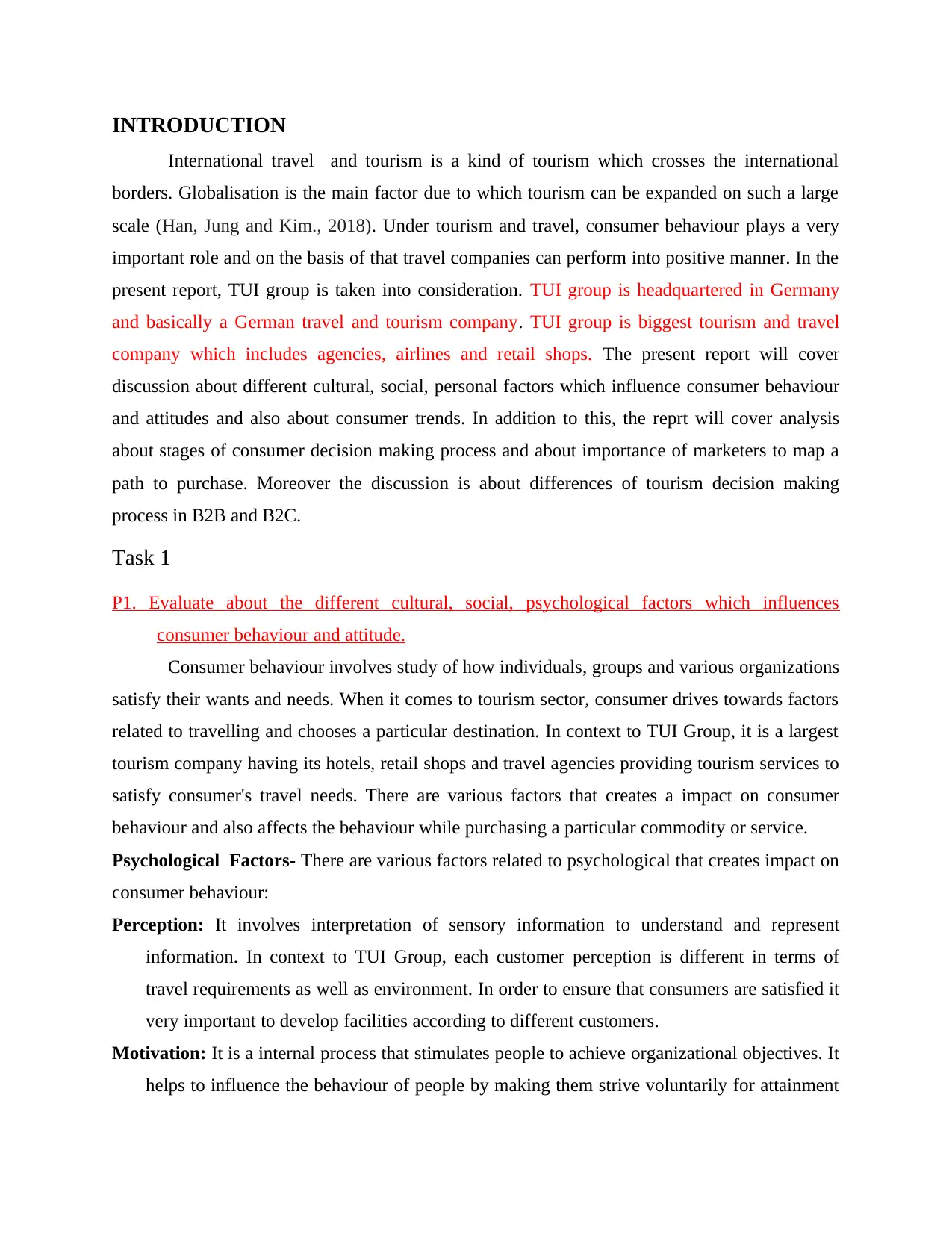
INTRODUCTION
International travel and tourism is a kind of tourism which crosses the international
borders. Globalisation is the main factor due to which tourism can be expanded on such a large
scale (Han, Jung and Kim., 2018). Under tourism and travel, consumer behaviour plays a very
important role and on the basis of that travel companies can perform into positive manner. In the
present report, TUI group is taken into consideration. TUI group is headquartered in Germany
and basically a German travel and tourism company. TUI group is biggest tourism and travel
company which includes agencies, airlines and retail shops. The present report will cover
discussion about different cultural, social, personal factors which influence consumer behaviour
and attitudes and also about consumer trends. In addition to this, the reprt will cover analysis
about stages of consumer decision making process and about importance of marketers to map a
path to purchase. Moreover the discussion is about differences of tourism decision making
process in B2B and B2C.
Task 1
P1. Evaluate about the different cultural, social, psychological factors which influences
consumer behaviour and attitude.
Consumer behaviour involves study of how individuals, groups and various organizations
satisfy their wants and needs. When it comes to tourism sector, consumer drives towards factors
related to travelling and chooses a particular destination. In context to TUI Group, it is a largest
tourism company having its hotels, retail shops and travel agencies providing tourism services to
satisfy consumer's travel needs. There are various factors that creates a impact on consumer
behaviour and also affects the behaviour while purchasing a particular commodity or service.
Psychological Factors- There are various factors related to psychological that creates impact on
consumer behaviour:
Perception: It involves interpretation of sensory information to understand and represent
information. In context to TUI Group, each customer perception is different in terms of
travel requirements as well as environment. In order to ensure that consumers are satisfied it
very important to develop facilities according to different customers.
Motivation: It is a internal process that stimulates people to achieve organizational objectives. It
helps to influence the behaviour of people by making them strive voluntarily for attainment
International travel and tourism is a kind of tourism which crosses the international
borders. Globalisation is the main factor due to which tourism can be expanded on such a large
scale (Han, Jung and Kim., 2018). Under tourism and travel, consumer behaviour plays a very
important role and on the basis of that travel companies can perform into positive manner. In the
present report, TUI group is taken into consideration. TUI group is headquartered in Germany
and basically a German travel and tourism company. TUI group is biggest tourism and travel
company which includes agencies, airlines and retail shops. The present report will cover
discussion about different cultural, social, personal factors which influence consumer behaviour
and attitudes and also about consumer trends. In addition to this, the reprt will cover analysis
about stages of consumer decision making process and about importance of marketers to map a
path to purchase. Moreover the discussion is about differences of tourism decision making
process in B2B and B2C.
Task 1
P1. Evaluate about the different cultural, social, psychological factors which influences
consumer behaviour and attitude.
Consumer behaviour involves study of how individuals, groups and various organizations
satisfy their wants and needs. When it comes to tourism sector, consumer drives towards factors
related to travelling and chooses a particular destination. In context to TUI Group, it is a largest
tourism company having its hotels, retail shops and travel agencies providing tourism services to
satisfy consumer's travel needs. There are various factors that creates a impact on consumer
behaviour and also affects the behaviour while purchasing a particular commodity or service.
Psychological Factors- There are various factors related to psychological that creates impact on
consumer behaviour:
Perception: It involves interpretation of sensory information to understand and represent
information. In context to TUI Group, each customer perception is different in terms of
travel requirements as well as environment. In order to ensure that consumers are satisfied it
very important to develop facilities according to different customers.
Motivation: It is a internal process that stimulates people to achieve organizational objectives. It
helps to influence the behaviour of people by making them strive voluntarily for attainment
⊘ This is a preview!⊘
Do you want full access?
Subscribe today to unlock all pages.

Trusted by 1+ million students worldwide
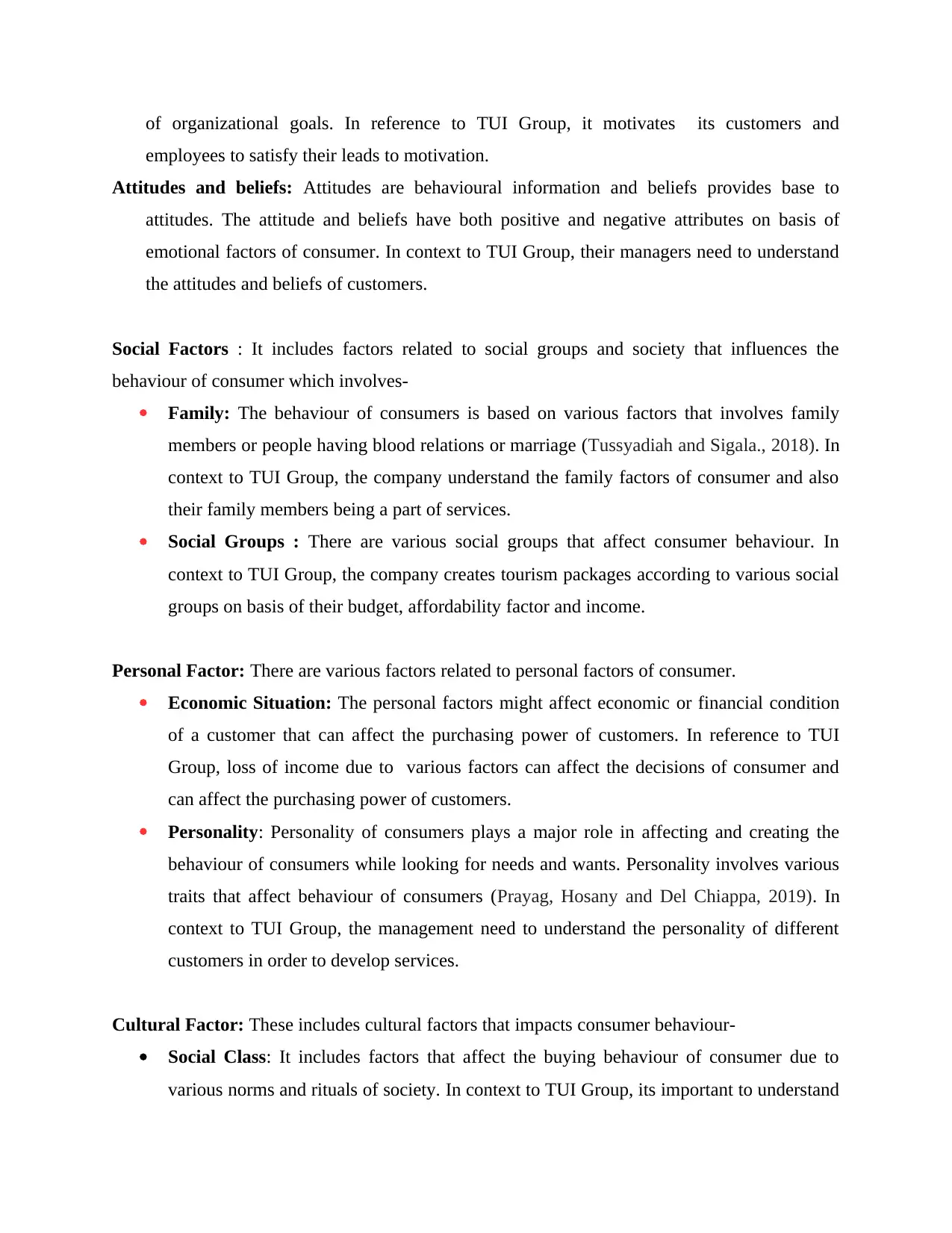
of organizational goals. In reference to TUI Group, it motivates its customers and
employees to satisfy their leads to motivation.
Attitudes and beliefs: Attitudes are behavioural information and beliefs provides base to
attitudes. The attitude and beliefs have both positive and negative attributes on basis of
emotional factors of consumer. In context to TUI Group, their managers need to understand
the attitudes and beliefs of customers.
Social Factors : It includes factors related to social groups and society that influences the
behaviour of consumer which involves-
Family: The behaviour of consumers is based on various factors that involves family
members or people having blood relations or marriage (Tussyadiah and Sigala., 2018). In
context to TUI Group, the company understand the family factors of consumer and also
their family members being a part of services.
Social Groups : There are various social groups that affect consumer behaviour. In
context to TUI Group, the company creates tourism packages according to various social
groups on basis of their budget, affordability factor and income.
Personal Factor: There are various factors related to personal factors of consumer.
Economic Situation: The personal factors might affect economic or financial condition
of a customer that can affect the purchasing power of customers. In reference to TUI
Group, loss of income due to various factors can affect the decisions of consumer and
can affect the purchasing power of customers.
Personality: Personality of consumers plays a major role in affecting and creating the
behaviour of consumers while looking for needs and wants. Personality involves various
traits that affect behaviour of consumers (Prayag, Hosany and Del Chiappa, 2019). In
context to TUI Group, the management need to understand the personality of different
customers in order to develop services.
Cultural Factor: These includes cultural factors that impacts consumer behaviour-
Social Class: It includes factors that affect the buying behaviour of consumer due to
various norms and rituals of society. In context to TUI Group, its important to understand
employees to satisfy their leads to motivation.
Attitudes and beliefs: Attitudes are behavioural information and beliefs provides base to
attitudes. The attitude and beliefs have both positive and negative attributes on basis of
emotional factors of consumer. In context to TUI Group, their managers need to understand
the attitudes and beliefs of customers.
Social Factors : It includes factors related to social groups and society that influences the
behaviour of consumer which involves-
Family: The behaviour of consumers is based on various factors that involves family
members or people having blood relations or marriage (Tussyadiah and Sigala., 2018). In
context to TUI Group, the company understand the family factors of consumer and also
their family members being a part of services.
Social Groups : There are various social groups that affect consumer behaviour. In
context to TUI Group, the company creates tourism packages according to various social
groups on basis of their budget, affordability factor and income.
Personal Factor: There are various factors related to personal factors of consumer.
Economic Situation: The personal factors might affect economic or financial condition
of a customer that can affect the purchasing power of customers. In reference to TUI
Group, loss of income due to various factors can affect the decisions of consumer and
can affect the purchasing power of customers.
Personality: Personality of consumers plays a major role in affecting and creating the
behaviour of consumers while looking for needs and wants. Personality involves various
traits that affect behaviour of consumers (Prayag, Hosany and Del Chiappa, 2019). In
context to TUI Group, the management need to understand the personality of different
customers in order to develop services.
Cultural Factor: These includes cultural factors that impacts consumer behaviour-
Social Class: It includes factors that affect the buying behaviour of consumer due to
various norms and rituals of society. In context to TUI Group, its important to understand
Paraphrase This Document
Need a fresh take? Get an instant paraphrase of this document with our AI Paraphraser
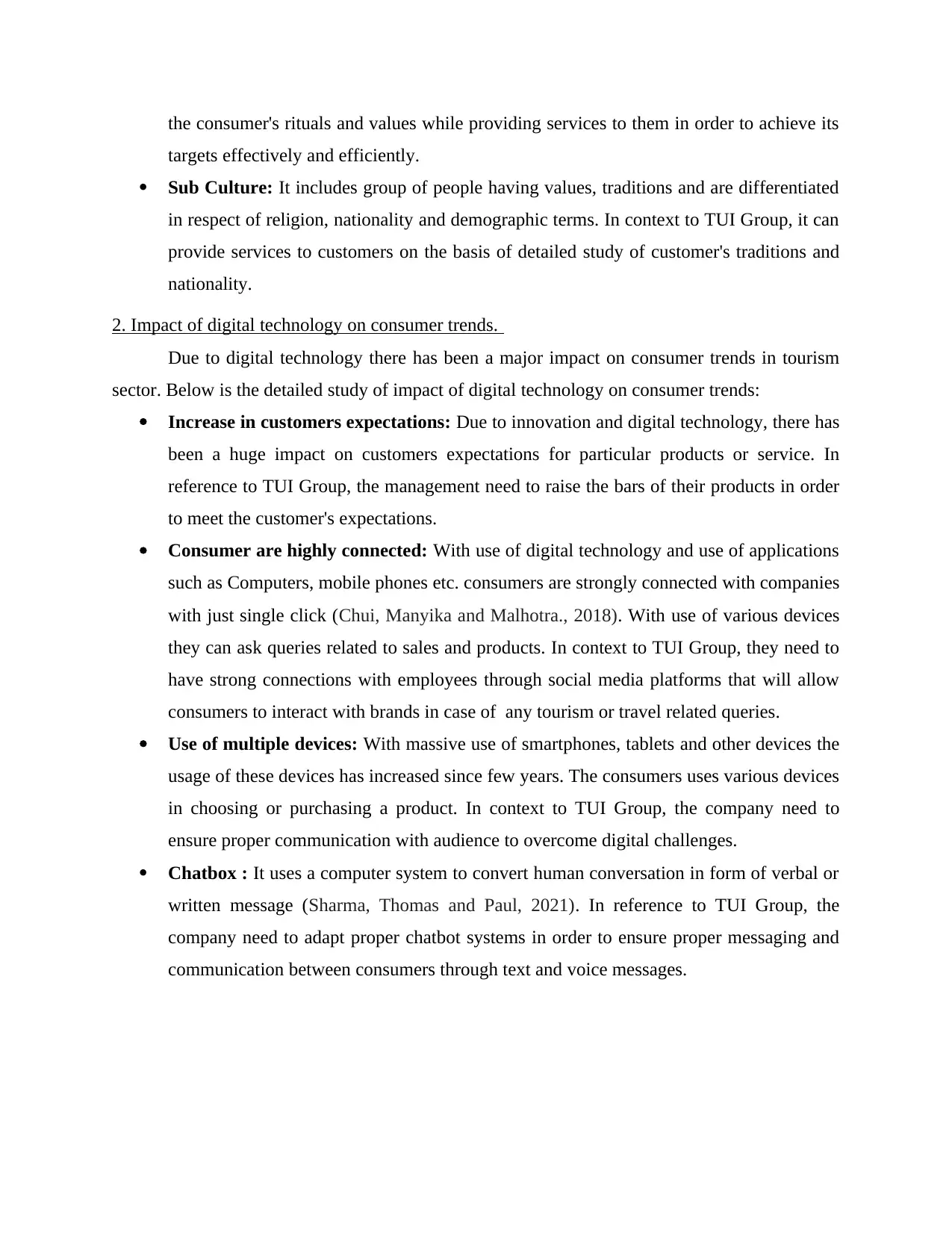
the consumer's rituals and values while providing services to them in order to achieve its
targets effectively and efficiently.
Sub Culture: It includes group of people having values, traditions and are differentiated
in respect of religion, nationality and demographic terms. In context to TUI Group, it can
provide services to customers on the basis of detailed study of customer's traditions and
nationality.
2. Impact of digital technology on consumer trends.
Due to digital technology there has been a major impact on consumer trends in tourism
sector. Below is the detailed study of impact of digital technology on consumer trends:
Increase in customers expectations: Due to innovation and digital technology, there has
been a huge impact on customers expectations for particular products or service. In
reference to TUI Group, the management need to raise the bars of their products in order
to meet the customer's expectations.
Consumer are highly connected: With use of digital technology and use of applications
such as Computers, mobile phones etc. consumers are strongly connected with companies
with just single click (Chui, Manyika and Malhotra., 2018). With use of various devices
they can ask queries related to sales and products. In context to TUI Group, they need to
have strong connections with employees through social media platforms that will allow
consumers to interact with brands in case of any tourism or travel related queries.
Use of multiple devices: With massive use of smartphones, tablets and other devices the
usage of these devices has increased since few years. The consumers uses various devices
in choosing or purchasing a product. In context to TUI Group, the company need to
ensure proper communication with audience to overcome digital challenges.
Chatbox : It uses a computer system to convert human conversation in form of verbal or
written message (Sharma, Thomas and Paul, 2021). In reference to TUI Group, the
company need to adapt proper chatbot systems in order to ensure proper messaging and
communication between consumers through text and voice messages.
targets effectively and efficiently.
Sub Culture: It includes group of people having values, traditions and are differentiated
in respect of religion, nationality and demographic terms. In context to TUI Group, it can
provide services to customers on the basis of detailed study of customer's traditions and
nationality.
2. Impact of digital technology on consumer trends.
Due to digital technology there has been a major impact on consumer trends in tourism
sector. Below is the detailed study of impact of digital technology on consumer trends:
Increase in customers expectations: Due to innovation and digital technology, there has
been a huge impact on customers expectations for particular products or service. In
reference to TUI Group, the management need to raise the bars of their products in order
to meet the customer's expectations.
Consumer are highly connected: With use of digital technology and use of applications
such as Computers, mobile phones etc. consumers are strongly connected with companies
with just single click (Chui, Manyika and Malhotra., 2018). With use of various devices
they can ask queries related to sales and products. In context to TUI Group, they need to
have strong connections with employees through social media platforms that will allow
consumers to interact with brands in case of any tourism or travel related queries.
Use of multiple devices: With massive use of smartphones, tablets and other devices the
usage of these devices has increased since few years. The consumers uses various devices
in choosing or purchasing a product. In context to TUI Group, the company need to
ensure proper communication with audience to overcome digital challenges.
Chatbox : It uses a computer system to convert human conversation in form of verbal or
written message (Sharma, Thomas and Paul, 2021). In reference to TUI Group, the
company need to adapt proper chatbot systems in order to ensure proper messaging and
communication between consumers through text and voice messages.
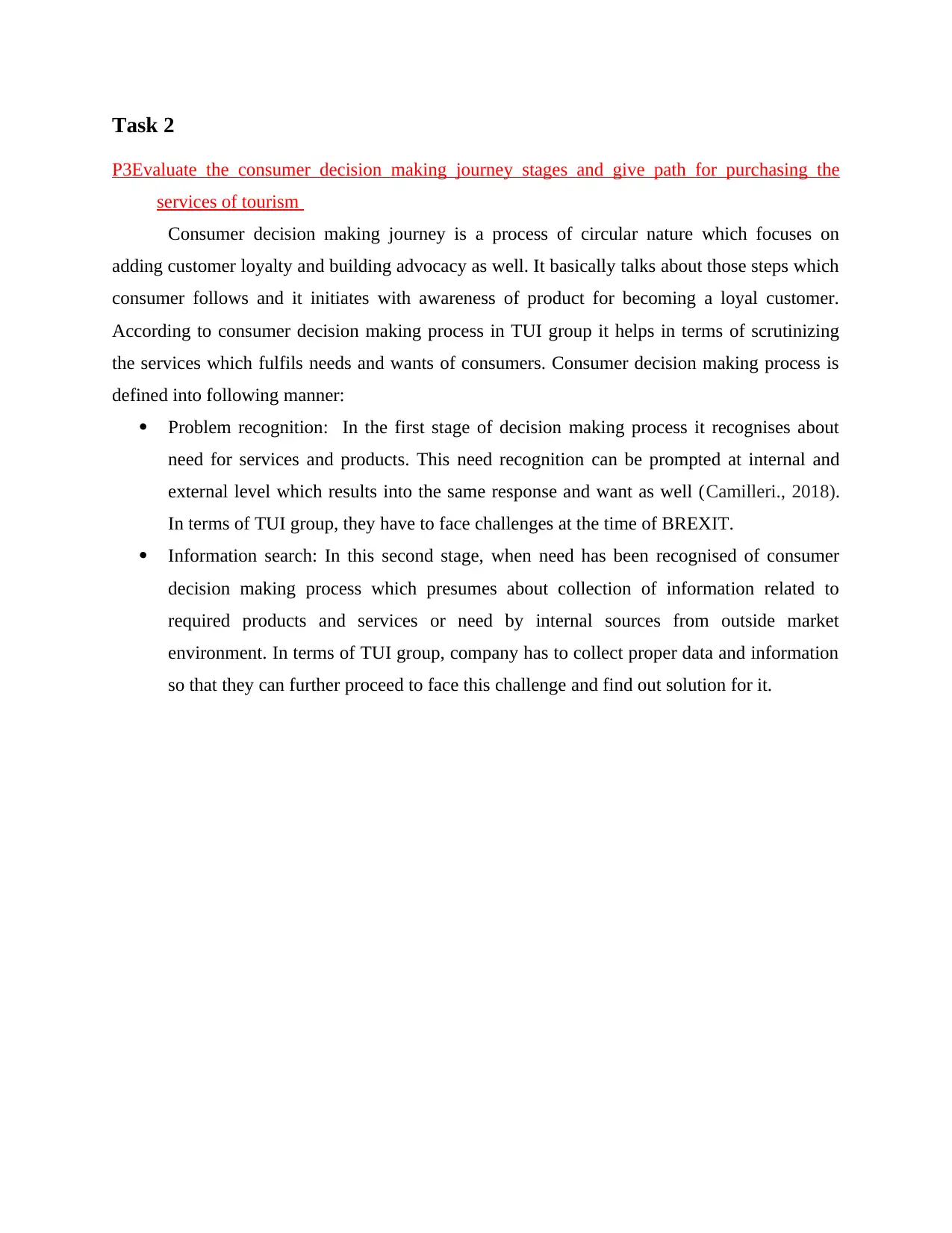
Task 2
P3Evaluate the consumer decision making journey stages and give path for purchasing the
services of tourism
Consumer decision making journey is a process of circular nature which focuses on
adding customer loyalty and building advocacy as well. It basically talks about those steps which
consumer follows and it initiates with awareness of product for becoming a loyal customer.
According to consumer decision making process in TUI group it helps in terms of scrutinizing
the services which fulfils needs and wants of consumers. Consumer decision making process is
defined into following manner:
Problem recognition: In the first stage of decision making process it recognises about
need for services and products. This need recognition can be prompted at internal and
external level which results into the same response and want as well (Camilleri., 2018).
In terms of TUI group, they have to face challenges at the time of BREXIT.
Information search: In this second stage, when need has been recognised of consumer
decision making process which presumes about collection of information related to
required products and services or need by internal sources from outside market
environment. In terms of TUI group, company has to collect proper data and information
so that they can further proceed to face this challenge and find out solution for it.
P3Evaluate the consumer decision making journey stages and give path for purchasing the
services of tourism
Consumer decision making journey is a process of circular nature which focuses on
adding customer loyalty and building advocacy as well. It basically talks about those steps which
consumer follows and it initiates with awareness of product for becoming a loyal customer.
According to consumer decision making process in TUI group it helps in terms of scrutinizing
the services which fulfils needs and wants of consumers. Consumer decision making process is
defined into following manner:
Problem recognition: In the first stage of decision making process it recognises about
need for services and products. This need recognition can be prompted at internal and
external level which results into the same response and want as well (Camilleri., 2018).
In terms of TUI group, they have to face challenges at the time of BREXIT.
Information search: In this second stage, when need has been recognised of consumer
decision making process which presumes about collection of information related to
required products and services or need by internal sources from outside market
environment. In terms of TUI group, company has to collect proper data and information
so that they can further proceed to face this challenge and find out solution for it.
⊘ This is a preview!⊘
Do you want full access?
Subscribe today to unlock all pages.

Trusted by 1+ million students worldwide
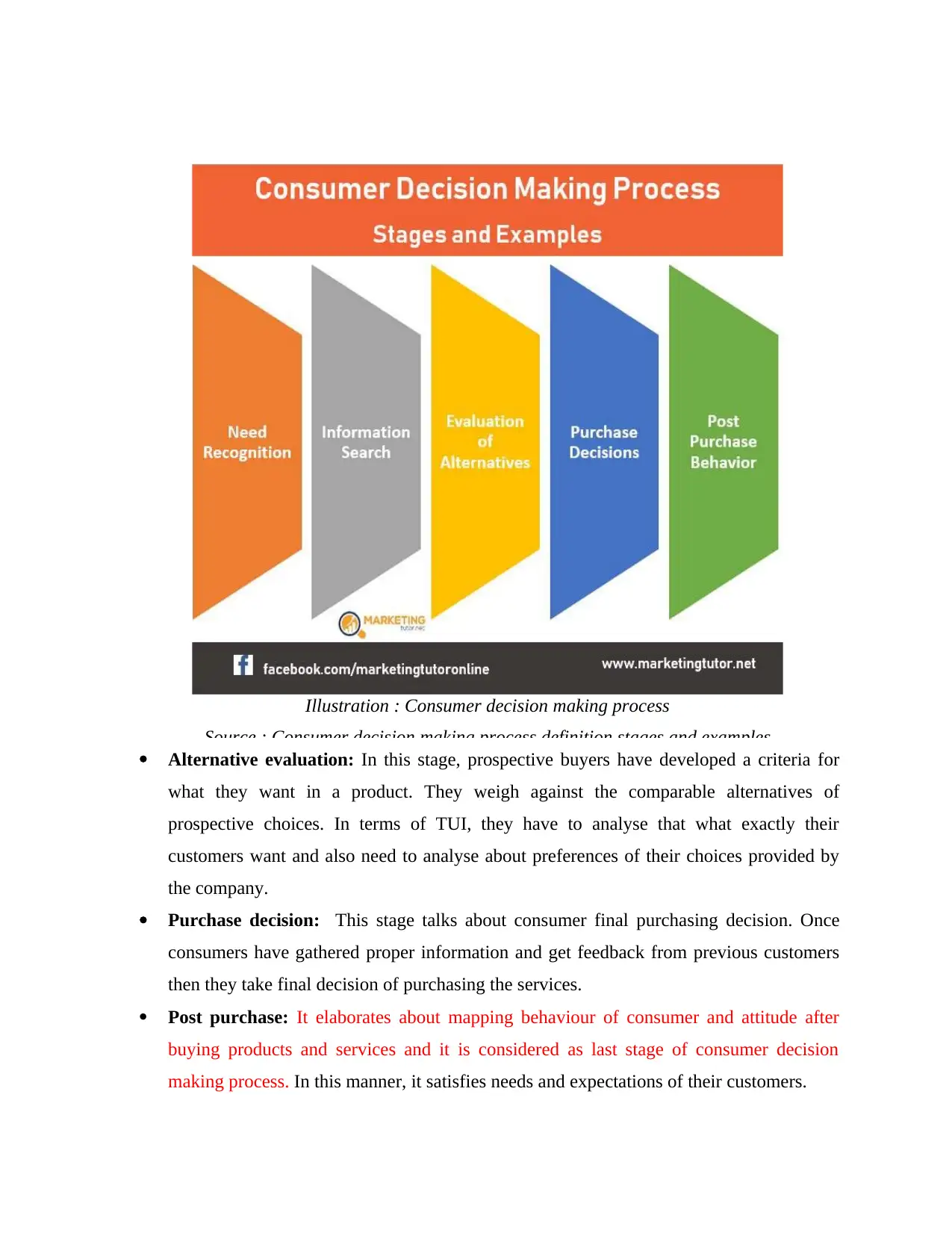
Alternative evaluation: In this stage, prospective buyers have developed a criteria for
what they want in a product. They weigh against the comparable alternatives of
prospective choices. In terms of TUI, they have to analyse that what exactly their
customers want and also need to analyse about preferences of their choices provided by
the company.
Purchase decision: This stage talks about consumer final purchasing decision. Once
consumers have gathered proper information and get feedback from previous customers
then they take final decision of purchasing the services.
Post purchase: It elaborates about mapping behaviour of consumer and attitude after
buying products and services and it is considered as last stage of consumer decision
making process. In this manner, it satisfies needs and expectations of their customers.
Illustration : Consumer decision making process
Source : Consumer decision making process definition stages and examples
what they want in a product. They weigh against the comparable alternatives of
prospective choices. In terms of TUI, they have to analyse that what exactly their
customers want and also need to analyse about preferences of their choices provided by
the company.
Purchase decision: This stage talks about consumer final purchasing decision. Once
consumers have gathered proper information and get feedback from previous customers
then they take final decision of purchasing the services.
Post purchase: It elaborates about mapping behaviour of consumer and attitude after
buying products and services and it is considered as last stage of consumer decision
making process. In this manner, it satisfies needs and expectations of their customers.
Illustration : Consumer decision making process
Source : Consumer decision making process definition stages and examples
Paraphrase This Document
Need a fresh take? Get an instant paraphrase of this document with our AI Paraphraser
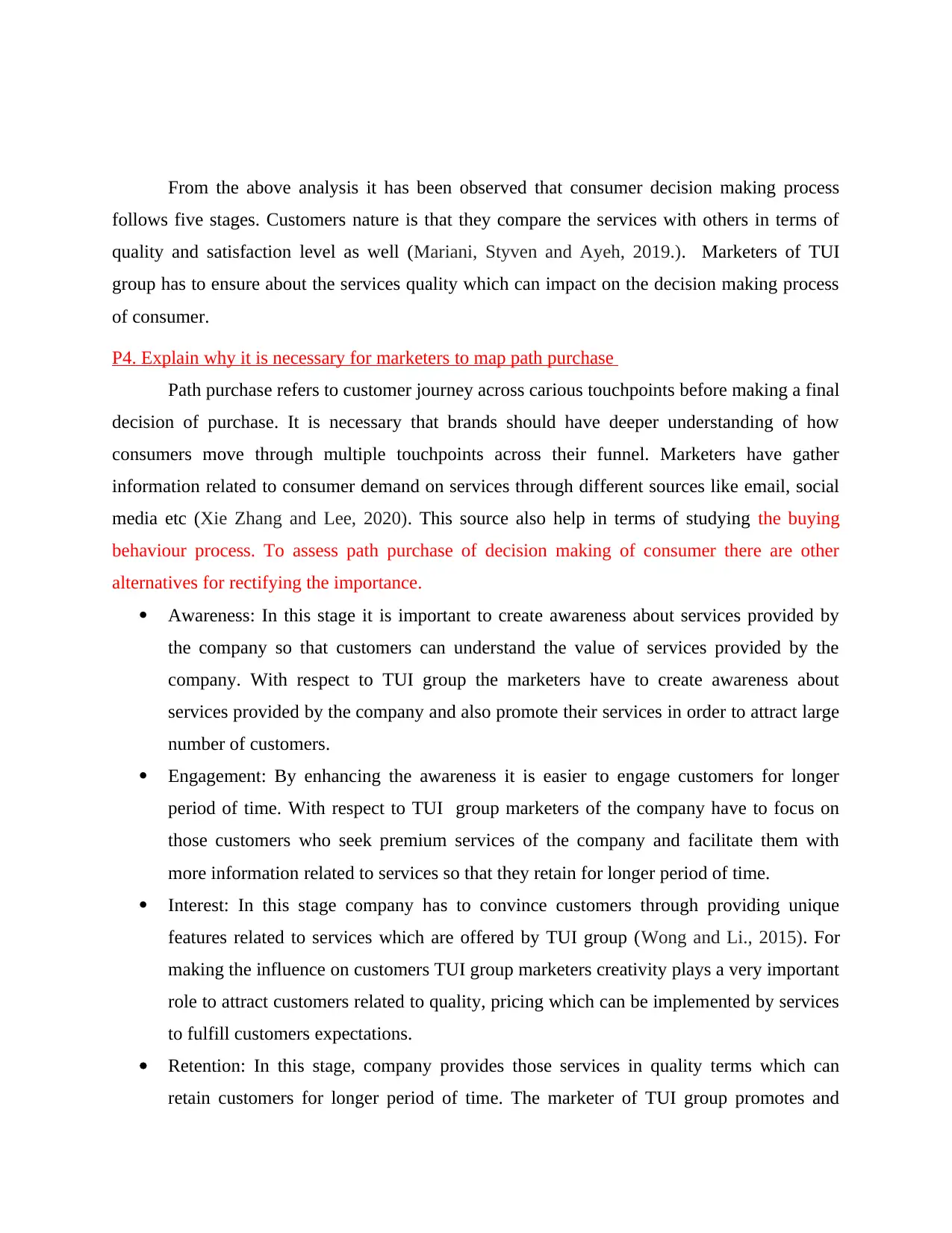
From the above analysis it has been observed that consumer decision making process
follows five stages. Customers nature is that they compare the services with others in terms of
quality and satisfaction level as well (Mariani, Styven and Ayeh, 2019.). Marketers of TUI
group has to ensure about the services quality which can impact on the decision making process
of consumer.
P4. Explain why it is necessary for marketers to map path purchase
Path purchase refers to customer journey across carious touchpoints before making a final
decision of purchase. It is necessary that brands should have deeper understanding of how
consumers move through multiple touchpoints across their funnel. Marketers have gather
information related to consumer demand on services through different sources like email, social
media etc (Xie Zhang and Lee, 2020). This source also help in terms of studying the buying
behaviour process. To assess path purchase of decision making of consumer there are other
alternatives for rectifying the importance.
Awareness: In this stage it is important to create awareness about services provided by
the company so that customers can understand the value of services provided by the
company. With respect to TUI group the marketers have to create awareness about
services provided by the company and also promote their services in order to attract large
number of customers.
Engagement: By enhancing the awareness it is easier to engage customers for longer
period of time. With respect to TUI group marketers of the company have to focus on
those customers who seek premium services of the company and facilitate them with
more information related to services so that they retain for longer period of time.
Interest: In this stage company has to convince customers through providing unique
features related to services which are offered by TUI group (Wong and Li., 2015). For
making the influence on customers TUI group marketers creativity plays a very important
role to attract customers related to quality, pricing which can be implemented by services
to fulfill customers expectations.
Retention: In this stage, company provides those services in quality terms which can
retain customers for longer period of time. The marketer of TUI group promotes and
follows five stages. Customers nature is that they compare the services with others in terms of
quality and satisfaction level as well (Mariani, Styven and Ayeh, 2019.). Marketers of TUI
group has to ensure about the services quality which can impact on the decision making process
of consumer.
P4. Explain why it is necessary for marketers to map path purchase
Path purchase refers to customer journey across carious touchpoints before making a final
decision of purchase. It is necessary that brands should have deeper understanding of how
consumers move through multiple touchpoints across their funnel. Marketers have gather
information related to consumer demand on services through different sources like email, social
media etc (Xie Zhang and Lee, 2020). This source also help in terms of studying the buying
behaviour process. To assess path purchase of decision making of consumer there are other
alternatives for rectifying the importance.
Awareness: In this stage it is important to create awareness about services provided by
the company so that customers can understand the value of services provided by the
company. With respect to TUI group the marketers have to create awareness about
services provided by the company and also promote their services in order to attract large
number of customers.
Engagement: By enhancing the awareness it is easier to engage customers for longer
period of time. With respect to TUI group marketers of the company have to focus on
those customers who seek premium services of the company and facilitate them with
more information related to services so that they retain for longer period of time.
Interest: In this stage company has to convince customers through providing unique
features related to services which are offered by TUI group (Wong and Li., 2015). For
making the influence on customers TUI group marketers creativity plays a very important
role to attract customers related to quality, pricing which can be implemented by services
to fulfill customers expectations.
Retention: In this stage, company provides those services in quality terms which can
retain customers for longer period of time. The marketer of TUI group promotes and
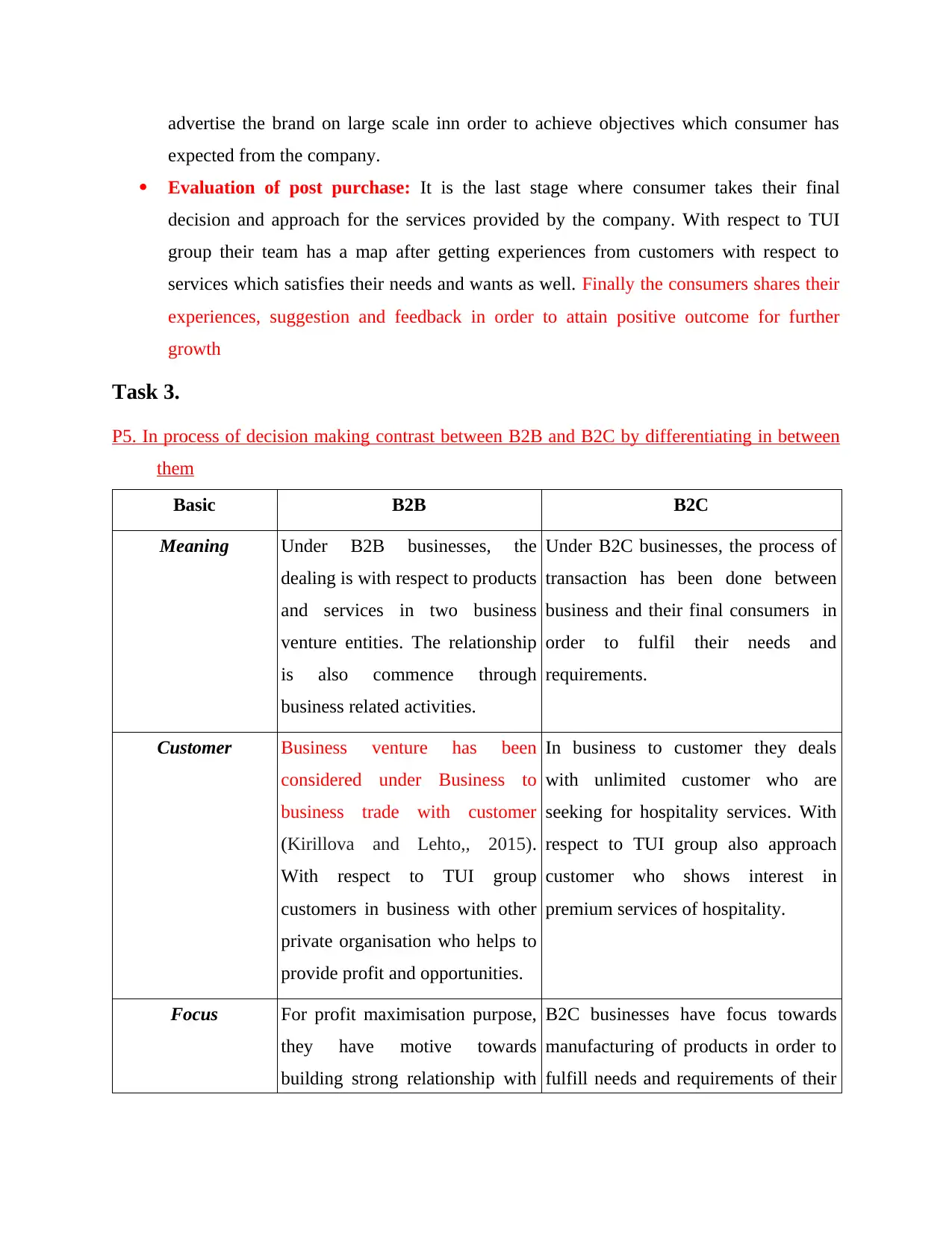
advertise the brand on large scale inn order to achieve objectives which consumer has
expected from the company.
Evaluation of post purchase: It is the last stage where consumer takes their final
decision and approach for the services provided by the company. With respect to TUI
group their team has a map after getting experiences from customers with respect to
services which satisfies their needs and wants as well. Finally the consumers shares their
experiences, suggestion and feedback in order to attain positive outcome for further
growth
Task 3.
P5. In process of decision making contrast between B2B and B2C by differentiating in between
them
Basic B2B B2C
Meaning Under B2B businesses, the
dealing is with respect to products
and services in two business
venture entities. The relationship
is also commence through
business related activities.
Under B2C businesses, the process of
transaction has been done between
business and their final consumers in
order to fulfil their needs and
requirements.
Customer Business venture has been
considered under Business to
business trade with customer
(Kirillova and Lehto,, 2015).
With respect to TUI group
customers in business with other
private organisation who helps to
provide profit and opportunities.
In business to customer they deals
with unlimited customer who are
seeking for hospitality services. With
respect to TUI group also approach
customer who shows interest in
premium services of hospitality.
Focus For profit maximisation purpose,
they have motive towards
building strong relationship with
B2C businesses have focus towards
manufacturing of products in order to
fulfill needs and requirements of their
expected from the company.
Evaluation of post purchase: It is the last stage where consumer takes their final
decision and approach for the services provided by the company. With respect to TUI
group their team has a map after getting experiences from customers with respect to
services which satisfies their needs and wants as well. Finally the consumers shares their
experiences, suggestion and feedback in order to attain positive outcome for further
growth
Task 3.
P5. In process of decision making contrast between B2B and B2C by differentiating in between
them
Basic B2B B2C
Meaning Under B2B businesses, the
dealing is with respect to products
and services in two business
venture entities. The relationship
is also commence through
business related activities.
Under B2C businesses, the process of
transaction has been done between
business and their final consumers in
order to fulfil their needs and
requirements.
Customer Business venture has been
considered under Business to
business trade with customer
(Kirillova and Lehto,, 2015).
With respect to TUI group
customers in business with other
private organisation who helps to
provide profit and opportunities.
In business to customer they deals
with unlimited customer who are
seeking for hospitality services. With
respect to TUI group also approach
customer who shows interest in
premium services of hospitality.
Focus For profit maximisation purpose,
they have motive towards
building strong relationship with
B2C businesses have focus towards
manufacturing of products in order to
fulfill needs and requirements of their
⊘ This is a preview!⊘
Do you want full access?
Subscribe today to unlock all pages.

Trusted by 1+ million students worldwide
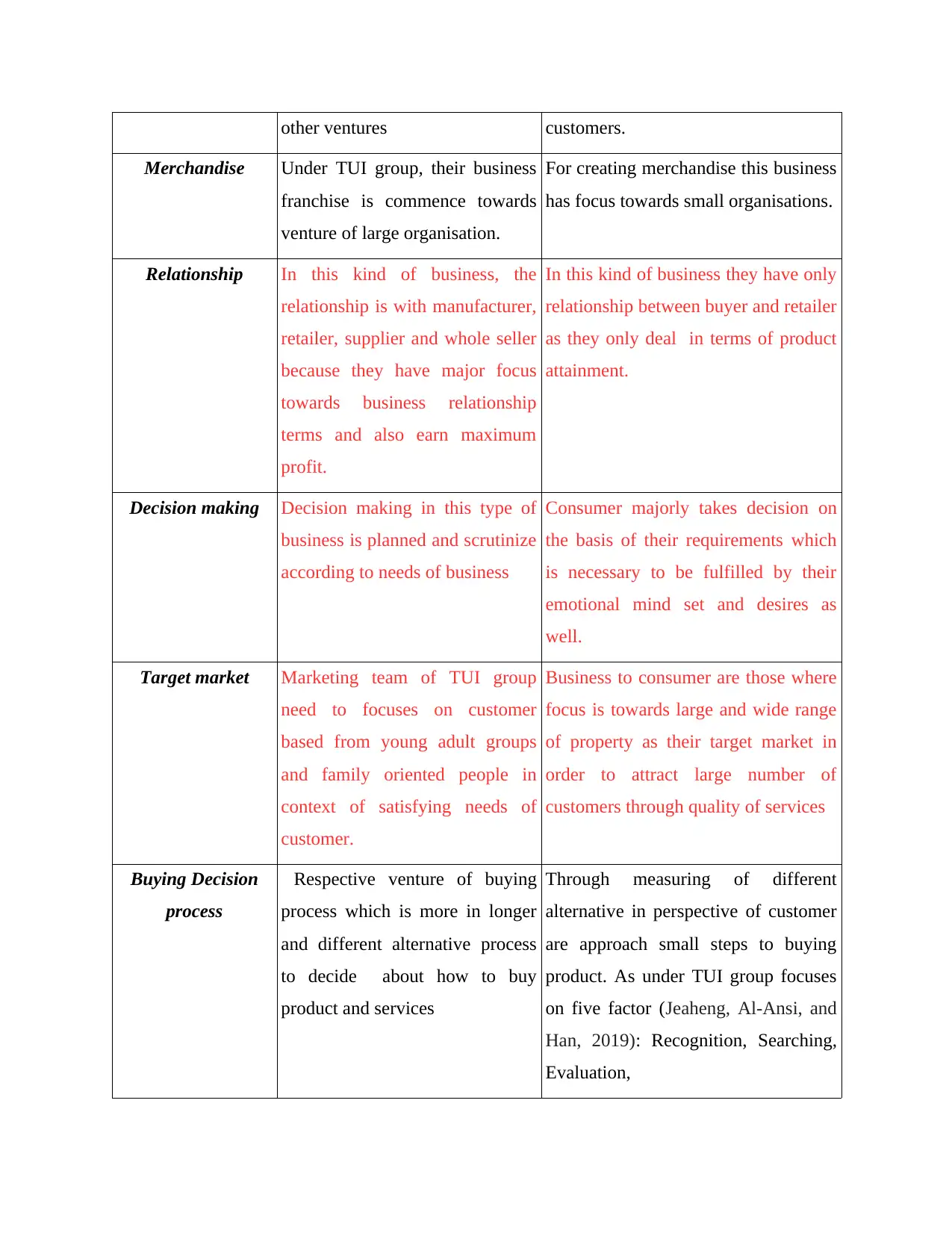
other ventures customers.
Merchandise Under TUI group, their business
franchise is commence towards
venture of large organisation.
For creating merchandise this business
has focus towards small organisations.
Relationship In this kind of business, the
relationship is with manufacturer,
retailer, supplier and whole seller
because they have major focus
towards business relationship
terms and also earn maximum
profit.
In this kind of business they have only
relationship between buyer and retailer
as they only deal in terms of product
attainment.
Decision making Decision making in this type of
business is planned and scrutinize
according to needs of business
Consumer majorly takes decision on
the basis of their requirements which
is necessary to be fulfilled by their
emotional mind set and desires as
well.
Target market Marketing team of TUI group
need to focuses on customer
based from young adult groups
and family oriented people in
context of satisfying needs of
customer.
Business to consumer are those where
focus is towards large and wide range
of property as their target market in
order to attract large number of
customers through quality of services
Buying Decision
process
Respective venture of buying
process which is more in longer
and different alternative process
to decide about how to buy
product and services
Through measuring of different
alternative in perspective of customer
are approach small steps to buying
product. As under TUI group focuses
on five factor (Jeaheng, Al-Ansi, and
Han, 2019): Recognition, Searching,
Evaluation,
Merchandise Under TUI group, their business
franchise is commence towards
venture of large organisation.
For creating merchandise this business
has focus towards small organisations.
Relationship In this kind of business, the
relationship is with manufacturer,
retailer, supplier and whole seller
because they have major focus
towards business relationship
terms and also earn maximum
profit.
In this kind of business they have only
relationship between buyer and retailer
as they only deal in terms of product
attainment.
Decision making Decision making in this type of
business is planned and scrutinize
according to needs of business
Consumer majorly takes decision on
the basis of their requirements which
is necessary to be fulfilled by their
emotional mind set and desires as
well.
Target market Marketing team of TUI group
need to focuses on customer
based from young adult groups
and family oriented people in
context of satisfying needs of
customer.
Business to consumer are those where
focus is towards large and wide range
of property as their target market in
order to attract large number of
customers through quality of services
Buying Decision
process
Respective venture of buying
process which is more in longer
and different alternative process
to decide about how to buy
product and services
Through measuring of different
alternative in perspective of customer
are approach small steps to buying
product. As under TUI group focuses
on five factor (Jeaheng, Al-Ansi, and
Han, 2019): Recognition, Searching,
Evaluation,
Paraphrase This Document
Need a fresh take? Get an instant paraphrase of this document with our AI Paraphraser
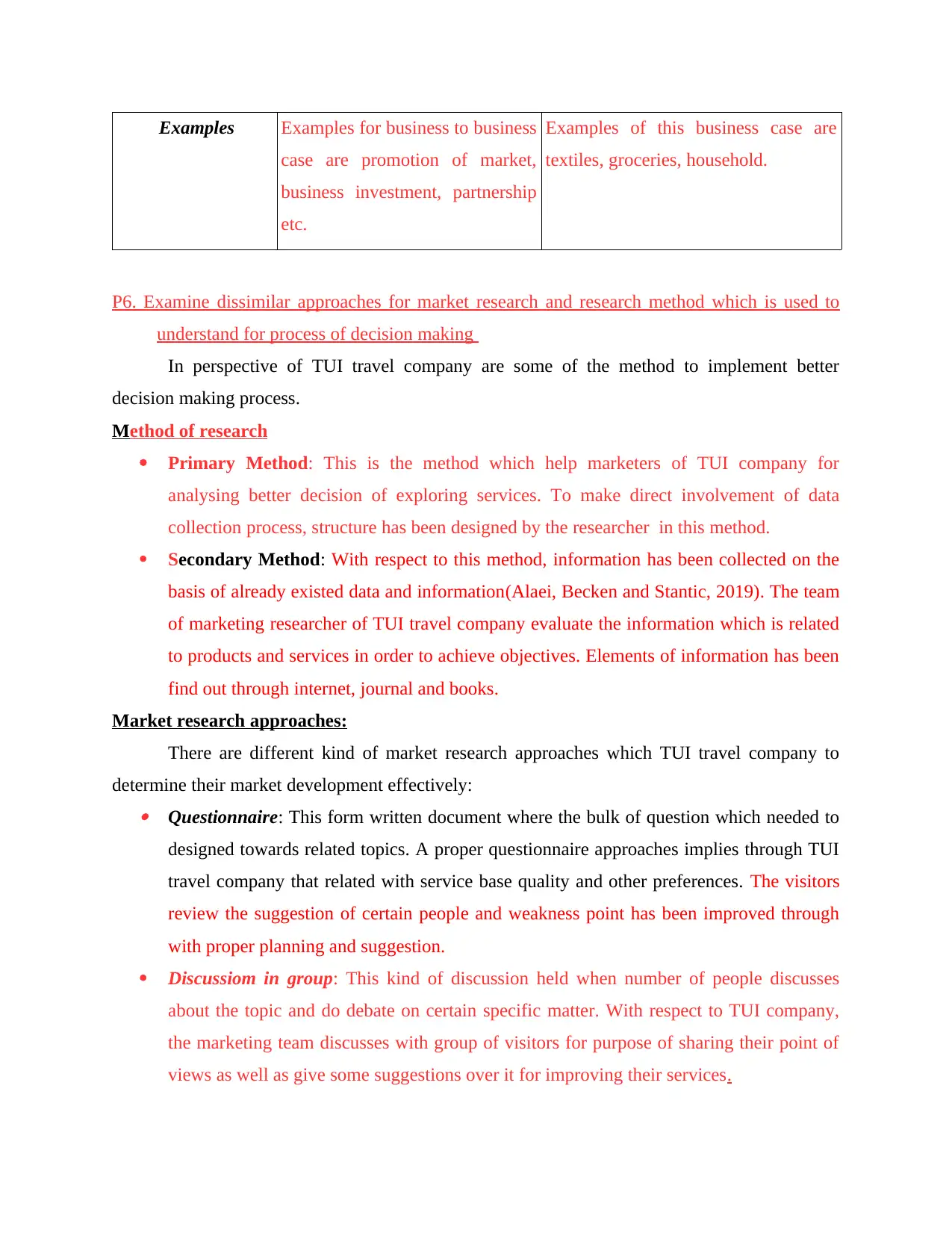
Examples Examples for business to business
case are promotion of market,
business investment, partnership
etc.
Examples of this business case are
textiles, groceries, household.
P6. Examine dissimilar approaches for market research and research method which is used to
understand for process of decision making
In perspective of TUI travel company are some of the method to implement better
decision making process.
Method of research
Primary Method: This is the method which help marketers of TUI company for
analysing better decision of exploring services. To make direct involvement of data
collection process, structure has been designed by the researcher in this method.
Secondary Method: With respect to this method, information has been collected on the
basis of already existed data and information(Alaei, Becken and Stantic, 2019). The team
of marketing researcher of TUI travel company evaluate the information which is related
to products and services in order to achieve objectives. Elements of information has been
find out through internet, journal and books.
Market research approaches:
There are different kind of market research approaches which TUI travel company to
determine their market development effectively: Questionnaire: This form written document where the bulk of question which needed to
designed towards related topics. A proper questionnaire approaches implies through TUI
travel company that related with service base quality and other preferences. The visitors
review the suggestion of certain people and weakness point has been improved through
with proper planning and suggestion.
Discussiom in group: This kind of discussion held when number of people discusses
about the topic and do debate on certain specific matter. With respect to TUI company,
the marketing team discusses with group of visitors for purpose of sharing their point of
views as well as give some suggestions over it for improving their services.
case are promotion of market,
business investment, partnership
etc.
Examples of this business case are
textiles, groceries, household.
P6. Examine dissimilar approaches for market research and research method which is used to
understand for process of decision making
In perspective of TUI travel company are some of the method to implement better
decision making process.
Method of research
Primary Method: This is the method which help marketers of TUI company for
analysing better decision of exploring services. To make direct involvement of data
collection process, structure has been designed by the researcher in this method.
Secondary Method: With respect to this method, information has been collected on the
basis of already existed data and information(Alaei, Becken and Stantic, 2019). The team
of marketing researcher of TUI travel company evaluate the information which is related
to products and services in order to achieve objectives. Elements of information has been
find out through internet, journal and books.
Market research approaches:
There are different kind of market research approaches which TUI travel company to
determine their market development effectively: Questionnaire: This form written document where the bulk of question which needed to
designed towards related topics. A proper questionnaire approaches implies through TUI
travel company that related with service base quality and other preferences. The visitors
review the suggestion of certain people and weakness point has been improved through
with proper planning and suggestion.
Discussiom in group: This kind of discussion held when number of people discusses
about the topic and do debate on certain specific matter. With respect to TUI company,
the marketing team discusses with group of visitors for purpose of sharing their point of
views as well as give some suggestions over it for improving their services.
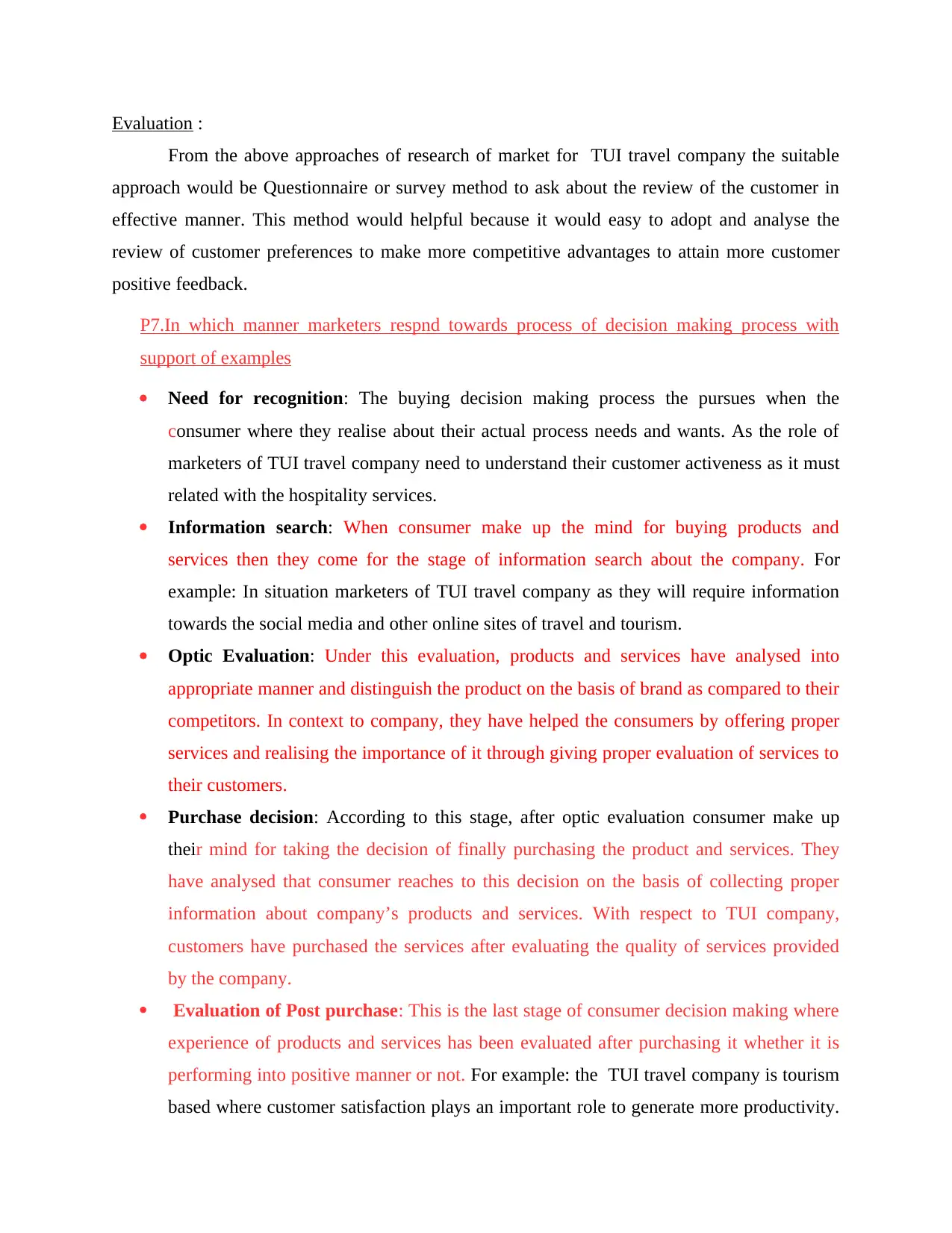
Evaluation :
From the above approaches of research of market for TUI travel company the suitable
approach would be Questionnaire or survey method to ask about the review of the customer in
effective manner. This method would helpful because it would easy to adopt and analyse the
review of customer preferences to make more competitive advantages to attain more customer
positive feedback.
P7.In which manner marketers respnd towards process of decision making process with
support of examples
Need for recognition: The buying decision making process the pursues when the
consumer where they realise about their actual process needs and wants. As the role of
marketers of TUI travel company need to understand their customer activeness as it must
related with the hospitality services.
Information search: When consumer make up the mind for buying products and
services then they come for the stage of information search about the company. For
example: In situation marketers of TUI travel company as they will require information
towards the social media and other online sites of travel and tourism.
Optic Evaluation: Under this evaluation, products and services have analysed into
appropriate manner and distinguish the product on the basis of brand as compared to their
competitors. In context to company, they have helped the consumers by offering proper
services and realising the importance of it through giving proper evaluation of services to
their customers.
Purchase decision: According to this stage, after optic evaluation consumer make up
their mind for taking the decision of finally purchasing the product and services. They
have analysed that consumer reaches to this decision on the basis of collecting proper
information about company’s products and services. With respect to TUI company,
customers have purchased the services after evaluating the quality of services provided
by the company.
Evaluation of Post purchase: This is the last stage of consumer decision making where
experience of products and services has been evaluated after purchasing it whether it is
performing into positive manner or not. For example: the TUI travel company is tourism
based where customer satisfaction plays an important role to generate more productivity.
From the above approaches of research of market for TUI travel company the suitable
approach would be Questionnaire or survey method to ask about the review of the customer in
effective manner. This method would helpful because it would easy to adopt and analyse the
review of customer preferences to make more competitive advantages to attain more customer
positive feedback.
P7.In which manner marketers respnd towards process of decision making process with
support of examples
Need for recognition: The buying decision making process the pursues when the
consumer where they realise about their actual process needs and wants. As the role of
marketers of TUI travel company need to understand their customer activeness as it must
related with the hospitality services.
Information search: When consumer make up the mind for buying products and
services then they come for the stage of information search about the company. For
example: In situation marketers of TUI travel company as they will require information
towards the social media and other online sites of travel and tourism.
Optic Evaluation: Under this evaluation, products and services have analysed into
appropriate manner and distinguish the product on the basis of brand as compared to their
competitors. In context to company, they have helped the consumers by offering proper
services and realising the importance of it through giving proper evaluation of services to
their customers.
Purchase decision: According to this stage, after optic evaluation consumer make up
their mind for taking the decision of finally purchasing the product and services. They
have analysed that consumer reaches to this decision on the basis of collecting proper
information about company’s products and services. With respect to TUI company,
customers have purchased the services after evaluating the quality of services provided
by the company.
Evaluation of Post purchase: This is the last stage of consumer decision making where
experience of products and services has been evaluated after purchasing it whether it is
performing into positive manner or not. For example: the TUI travel company is tourism
based where customer satisfaction plays an important role to generate more productivity.
⊘ This is a preview!⊘
Do you want full access?
Subscribe today to unlock all pages.

Trusted by 1+ million students worldwide
1 out of 14
Related Documents
Your All-in-One AI-Powered Toolkit for Academic Success.
+13062052269
info@desklib.com
Available 24*7 on WhatsApp / Email
![[object Object]](/_next/static/media/star-bottom.7253800d.svg)
Unlock your academic potential
Copyright © 2020–2026 A2Z Services. All Rights Reserved. Developed and managed by ZUCOL.





